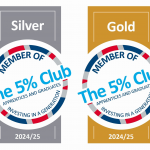Nearly one year on from the Ofqual confusion that resulted in thousands of A Levels students being awarded results by a mutant algorithm the lasting damage that has been done to the country’s education system continues to occupy everyone’s thoughts. At The 5% Club, where our vision is to increase equality and social mobility, through work based learning opportunities, we’re just as concerned about the impact of the crisis on young people entering the world of work for the first time.

In the early days of the pandemic The 5% Club published a rallying call (We can’t let our young people bear the economic brunt of COVID-19) to business leaders and government urging them not to allow apprentices and trainees to bear the brunt of the pandemic. We asked our members, all of whom are committed to developing their workforce through the ‘earn and learn’ model, what their business had been doing to mitigate the threats to equality in the workplace posed by Covid 19.
The good news is that The 5% Club businesses had a largely positive story to tell. Many had managed to retain their apprentices and graduate trainees; in one case in the face of serious staff cutbacks. In the construction industry, which was one of the first sectors able to return to work after the first lockdown, businesses were actively recruiting. For example, early in the pandemic VINCI Construction UK (multinational infrastructure and facilities) held virtual assessment and interview days for apprentices to work on HS2 Birmingham. Towards the end of the year, when they were recruiting apprentices for an additional project, they were holding face-to-face interviews. “We recruited apprentices through a mix of online interviews and where possible face-to-face, giving the candidates both options.” said Vinci Academy Manager Milena Davis.
Our members told us they had liaised closely with colleges, universities and other learning providers so that their ‘earn and learn’ cohort had access to the online training and support they needed. Many, like Lockheed Martin (global security and aerospace), had pivoted to virtual inductions including online ‘meet and greets’ with colleagues, to ensure young recruits felt part of the team. “Virtual delivery while working from home is crucial to our early career programmes. This is to ensure that the new cohorts of placements still experience meeting their fellow colleagues and hearing from experienced professionals around the business, just as they would have done in person.” said Andrea Labrum, Early Careers and Learning Lead. Others like Sweet Construct (Bristol-based construction) talked about the importance of regular catch up sessions for apprentices using online platforms, as well as ensuring they had the opportunity to build virtual networks throughout the business.
Most reassuring of all was the commitment shown by so many of The 5% Club member businesses to the mental health and wellbeing of their young apprentices and graduates. At MBDA (European missile systems) after a survey of apprentices highlighted that they had “increased levels of anxiety and stress amongst this population”, they stepped up an existing programme of resilience workshops and gave apprentices access to additional mental health resources including via a phone app. Cathy Strachan MBE, HR Manager in Learning & Development, told us “The Generation Healthy Minds masterclasses and the Emoquo app both provide important resources providing help and support to those who need it.” Vinci extended their support service to 24 hours a day, seven days a week to assist their apprentices in managing their anxiety due to constant changes. Schneider Electric (multinational energy and digital solutions) instigated a programme of wellbeing ‘check-ins’ for apprentices, bolstered by an employee-led wellbeing support network.
While this is only a small sample, it is clear that The 5% Club members continue to treat their apprentices and graduate trainees as essential employees. Rather than reconsidering their commitment to ‘earn and learn’ in difficult times, they recognise that investing in their young people is how they will build a prosperous thriving business. Over the next few months, as businesses begin to emerge into a post-Covid and post-Brexit world, it will be important for efforts to continue and for ‘earn and learn’ to play a vital role in getting the UK economy back on track.




